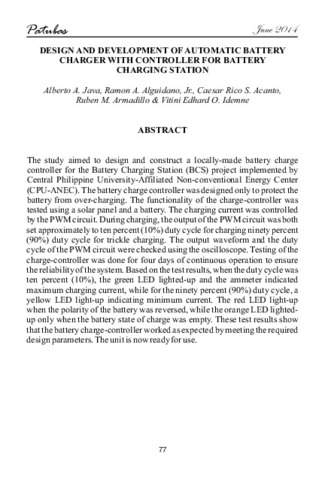Показать сокращенную информацию
Design and development of automatic battery charger with controller for battery charging station
| dc.contributor.author | Java, Alberto A. | |
| dc.contributor.author | Alguidano, Ramon A. Jr. | |
| dc.contributor.author | Acanto, Caesar Rico S. | |
| dc.contributor.author | Armadillo, Ruben M. | |
| dc.contributor.author | Idemne, Vitini Edhard O. | |
| dc.date.accessioned | 2020-12-29T06:06:08Z | |
| dc.date.available | 2020-12-29T06:06:08Z | |
| dc.date.issued | 2012-6 | |
| dc.identifier.citation | Java, A. A., Alguidano, R. A., Jr., Acanto, C. R. S., Armadillo, R. M., & Idemne, V. E. O. (2012). Design and development of automatic battery charger with controller for battery charging station. Patubas, 7(1), 77-87. | en_US |
| dc.identifier.issn | 1908-515X | |
| dc.identifier.uri | https://hdl.handle.net/20.500.12852/56 | |
| dc.description.abstract | The study aimed to design and construct a locally-made battery charge controller for the Battery Charging Station (BCS) project implemented by Central Philippine University-Affiliated Non-conventional Energy Center (CPU-ANEC). The battery charge controller was designed only to protect the battery from over-charging. The functionality of the charge-controller was tested using a solar panel and a battery. The charging current was controlled by the PWM circuit. During charging, the output of the PWM circuit was both set approximately to ten percent (10%) duty cycle for charging ninety percent (90%) duty cycle for trickle charging. The output waveform and the duty cycle of the PWM circuit were checked using the oscilloscope. Testing of the charge-controller was done for four days of continuous operation to ensure the reliability of the system. Based on the test results, when the duty cycle was ten percent (10%), the green LED lighted-up and the ammeter indicated maximum charging current, while for the ninety percent (90%) duty cycle, a yellow LED light-up indicating minimum current. The red LED light-up when the polarity of the battery was reversed, while the orange LED lightedup only when the battery state of charge was empty. These test results show that the battery charge-controller worked as expected by meeting the required design parameters. The unit is now ready for use. | en_US |
| dc.language.iso | en | en_US |
| dc.publisher | Central Philippine University | en_US |
| dc.subject.lcsh | Battery chargers--Design and construction | en_US |
| dc.subject.lcsh | Electric current regulators | en_US |
| dc.subject.lcsh | Battery chargers | en |
| dc.title | Design and development of automatic battery charger with controller for battery charging station | en_US |
| dc.type | Article | en_US |
| dc.citation.firstpage | 77 | en_US |
| dc.citation.lastpage | 87 | en_US |
| dc.citation.journaltitle | Patubas | |
| dc.citation.volume | 7 | en_US |
| dc.citation.issue | 1 | en_US |
| local.relation.associatedcontent | https://repository.cpu.edu.ph/handle/20.500.12852/890 Research report | en |
Файлы в этом документе
Данный элемент включен в следующие коллекции
-
Patubas [110]
Patubas is a refereed research journal of Central Philippine University.


